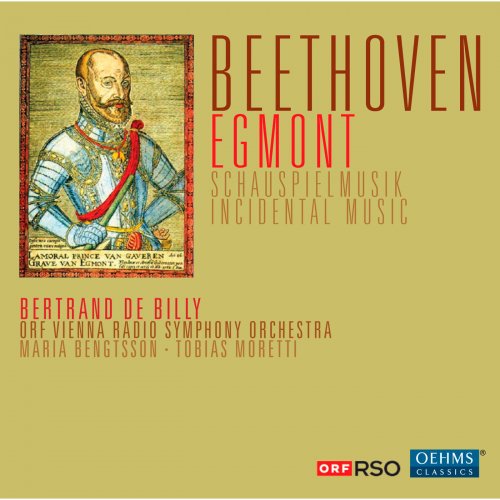
Tobias Moretti, Maria Bengtsson, ORF Radio Symphony Orchestra Vienna, Bertrand de Billy - Beethoven: Egmont Incidental Music, Op. 84 (2011)
BAND/ARTIST: Tobias Moretti, Maria Bengtsson, ORF Radio Symphony Orchestra Vienna, Bertrand de Billy
- Title: Beethoven: Egmont Incidental Music, Op. 84
- Year Of Release: 2011
- Label: Oehms Classics
- Genre: Classical
- Quality: flac lossless +Booklet
- Total Time: 00:46:36
- Total Size: 186 mm
- WebSite: Album Preview
Tracklist
01. Egmont, Op. 84: Overture
02. Egmont, Op. 84: Narrator: Ihro Majestat - auf das Wohl Philipps II von Spanien
03. Egmont, Op. 84: Song, Die Trommel geruhret (The Drum Resounds) (Clara)
04. Egmont, Op. 84: Dem Fussganger wird schwindlig
05. Egmont, Op. 84: Entr'acte No. 1: Andante - Allegro con Brio
06. Egmont, Op. 84: Aber die Provinzen aufrufen zu offener Gewalt
07. Egmont, Op. 84: Entr'acte No. 2: Larghetto
08. Egmont, Op. 84: Pah, Egmonts Geliebte
09. Egmont, Op. 84: Freudvoll und leidvoll (Blissful and Tearful) (Clara)
10. Egmont, Op. 84: Entr'acte No. 3: Allegro - Marcia, Vivace
11. Egmont, Op. 84: Seit der Herzog von Alba in die Stadt eingezogen ist
12. Egmont, Op. 84: Entr'acte No. 4: Larghetto
13. Egmont, Op. 84: Ja komm mit
14. Egmont, Op. 84: Clara's Death: Larghetto
15. Egmont, Op. 84: Melodram: Susser Schlaf, du kommst wie reines Gluck
16. Egmont, Op. 84: Sieges Symphonie
Goethe's play Egmont, a sort of Shakespearean historical drama spiced with subjective Romantic excess, attracted Beethoven, who wrote incidental music for it in 1809. The music has elements in common with that in the opera Fidelio, but Beethoven never struggled with the music in the same way, and the Egmont music is in some respects more assured. Nevertheless, recordings of the work have been sparse, probably because of the decline of the incidental music genre. The longtime recording of choice was made by George Szell and the Vienna Philharmonic with soprano Pilar Lorengar in the 1960s, but this well-engineered effort by the Vienna Radio Symphony Orchestra, conducted by Bertrand de Billy, gives it a run for its money, with modern sound. The score consists of a large overture that is often performed by itself, a concluding "Siegessymphonie" (Victory Symphony) reprising the overture; arias for Klärchen, the mistress of the doomed Flemish king Egmont; entr'acte pieces; spoken-word summaries reflecting Beethoven's intention to see the work performed on the concert stage; and finally a melodrama passage at the end in which the narrator describes Klärchen's suicide. The transition from this passage to the final Siegessymphonie anticipates late Beethoven, and de Billy perfectly captures its sense of tragedy evolving into conventional but transcendent music. Soprano Maria Bengtsson has presence and depth, and the orchestral set pieces are dynamic but not overdone.
01. Egmont, Op. 84: Overture
02. Egmont, Op. 84: Narrator: Ihro Majestat - auf das Wohl Philipps II von Spanien
03. Egmont, Op. 84: Song, Die Trommel geruhret (The Drum Resounds) (Clara)
04. Egmont, Op. 84: Dem Fussganger wird schwindlig
05. Egmont, Op. 84: Entr'acte No. 1: Andante - Allegro con Brio
06. Egmont, Op. 84: Aber die Provinzen aufrufen zu offener Gewalt
07. Egmont, Op. 84: Entr'acte No. 2: Larghetto
08. Egmont, Op. 84: Pah, Egmonts Geliebte
09. Egmont, Op. 84: Freudvoll und leidvoll (Blissful and Tearful) (Clara)
10. Egmont, Op. 84: Entr'acte No. 3: Allegro - Marcia, Vivace
11. Egmont, Op. 84: Seit der Herzog von Alba in die Stadt eingezogen ist
12. Egmont, Op. 84: Entr'acte No. 4: Larghetto
13. Egmont, Op. 84: Ja komm mit
14. Egmont, Op. 84: Clara's Death: Larghetto
15. Egmont, Op. 84: Melodram: Susser Schlaf, du kommst wie reines Gluck
16. Egmont, Op. 84: Sieges Symphonie
Goethe's play Egmont, a sort of Shakespearean historical drama spiced with subjective Romantic excess, attracted Beethoven, who wrote incidental music for it in 1809. The music has elements in common with that in the opera Fidelio, but Beethoven never struggled with the music in the same way, and the Egmont music is in some respects more assured. Nevertheless, recordings of the work have been sparse, probably because of the decline of the incidental music genre. The longtime recording of choice was made by George Szell and the Vienna Philharmonic with soprano Pilar Lorengar in the 1960s, but this well-engineered effort by the Vienna Radio Symphony Orchestra, conducted by Bertrand de Billy, gives it a run for its money, with modern sound. The score consists of a large overture that is often performed by itself, a concluding "Siegessymphonie" (Victory Symphony) reprising the overture; arias for Klärchen, the mistress of the doomed Flemish king Egmont; entr'acte pieces; spoken-word summaries reflecting Beethoven's intention to see the work performed on the concert stage; and finally a melodrama passage at the end in which the narrator describes Klärchen's suicide. The transition from this passage to the final Siegessymphonie anticipates late Beethoven, and de Billy perfectly captures its sense of tragedy evolving into conventional but transcendent music. Soprano Maria Bengtsson has presence and depth, and the orchestral set pieces are dynamic but not overdone.
Year 2021 | Classical | FLAC / APE
As a ISRA.CLOUD's PREMIUM member you will have the following benefits:
- Unlimited high speed downloads
- Download directly without waiting time
- Unlimited parallel downloads
- Support for download accelerators
- No advertising
- Resume broken downloads


